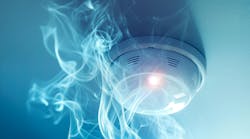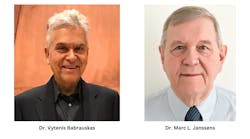Q: The question asked last month needs repeating because the answer requires further explanation. If fire alarm initiating device circuit (IDC) wiring is supervised, then doesn't a broken wire to a suppression activation switch cause a “supervisory signal” to be produced?
A: As a stated last month: No, never. There is a lot of confusion associated with the code's various uses of the term “supervise.” We also have “supervision,” “supervising” and “supervised” used throughout NFPA 72 and some building codes. Sometimes it is even used differently by the various chapters of NFPA 72. Here are more instances of “supervision.” There are still more uses of supervision which will be covered in the next issue followed by a test.
Supervisory Service. NFPA states that this term refers to “the service required to monitor performance of guard tours and the operative condition of fixed suppression systems or other systems for the protection of life and property.” One of the “other systems” this refers to is fire alarm control panels installed strictly to provide elevator control/recall and monitor its associated equipment. NFPA 72 states these systems are also providing “supervisory service.”
People are Supervised. When NFPA 72 states that: “Installation personnel shall be supervised by persons who are qualified and experienced in the installation, inspection, and testing of fire alarm systems,” it again requires an operation to be overseen. In defining “home day-care” NFPA 72 states that these occupants get “supervision” from persons “other than their relatives.” NFPA also has rules for how security guards are to be “supervised.” Although these people require “supervision” no signals are involved. However, if a guard is more than 15 minutes late starting or ending his scheduled guard-tour of the building, he would generate a “delinquency signal,” which is “a signal indicating the need for action in connection with the supervision of guards or system attendants.”
Automatic Alarm Detectors Can Cause a Supervisory Signal . Today, HVAC duct detectors are required to cause a “supervisory signal” (not an alarm), by the majority of the building and fire codes. Also, the automatic activation of smoke, heat, and waterflow detectors, used by fire alarm control panels dedicated to elevator recall, are permitted to cause a “supervisory signal” when there is no fire alarm system in the building.
Supervised Daily Test. NFPA 72 states: “Because digital alarm communicator systems establish communications channels between the protected premises and the central station via the public switched telephone network, the requirement to supervise circuits between the protected premises and the central station is considered to be met if the communications channel is periodically tested….” When the remote station doesn't receive this supervised daily test signal, it is treated as a trouble signal by central station operators. Table 8.5.3.5.6 also acknowledges that opening and closing signals from burglar alarm systems are “supervised.”
Coming Next Month, more on “Supervision, Supervising, Supervised.” Can you stand it? .

